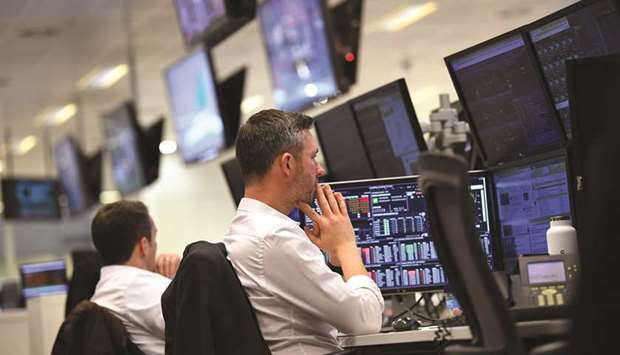Stock markets rose yesterday, extending a Wall Street rally sparked by dovish Federal Reserve statements, while oil prices fell dramatically due to an unexpected jump in US inventories.
A day after surging by 2%, Wall Street’s main exchanges pushed higher in midday trading, despite new US payrolls data showing that hiring crashed last month.
The US rally on Tuesday came after Federal Reserve chief Jerome Powell opened the door to a potential interest rate cut, saying ongoing trade conflicts had dimmed the growth outlook and the Fed would be watchful as a result to ensure the economy remained on track.
Briefing.com analyst Patrick O’Hare said that while the hiring data will “foment the concerns about the US economy slowing” it would also “feed the market’s belief that the Fed is going to be forced to cut the Fed funds rate sooner rather than later”.
In commodities, the price of a barrel of Brent crude oil fell more than three dollars to below the $60 mark for the first time in four months, while the benchmark WTI crude lost more than two dollars.
The price drops came after a report by the US Energy Information Administration reporting that the country’s crude stockpiles had increased by more than expected.
Europe’s main stock markets also ticked upwards, with London’s benchmark FTSE 100 up 0.1% to 7,220.22 points and Frankfurt’s DAX 30 index rising 0.1% to 11,980.81 while the Paris CAC 40 0.4% higher at 5,292.00 points at close yesterday.
“Investors are hoping, or betting even, that the European Central Bank’s Mario Draghi will deliver a dovish press conference today, pushing rate hike expectations further out,” said Fawad Razaqzada at Forex.com.
Buying was supported also by more favourable news on the trade front, with Beijing backing negotiations to resolve its stand-off with Washington and congressional Republicans opposing President Donald Trump’s tariff threats against Mexico.
However International Monetary Fund chief Christine Lagarde issued a warning about the state of the global economy, saying that the “immediate priority” of this weekend’s G20 meeting was “current trade tensions”.
She also said the tit-for-tat tariffs between the US and China had put the brakes on growth in both countries and cut a few points off global growth.
“These are self-inflicted wounds that must be avoided,” she said.
The IMF also lowered China’s economic growth forecast for 2019 and 2020, citing “uncertainty” over the US-China trade war.
And a World Bank report showing reduced global growth forecasts for the year suggested that investors could expect trade headwinds to continue for some time yet.
The world economy is now expected to expand by 2.6% this year, three tenths of a percentage point lower than the January forecast, and well below the 3% growth of 2018, according to the Global Economic Prospects report.
The US-China trade spat has seen the world’s top two economies deploy retaliatory tariffs on trade worth hundreds of billions of dollars, with no date set for stalled talks to resume.
But there are hopes that Trump and Chinese President Xi Jinping will meet at the G20 summit in Japan this month to jump-start negotiations.
Meanwhile, sterling rose to a seven-day high yesterday, helped by a weaker dollar and a slightly better-than-expected reading of a closely watched survey on Britain’s services sector.
With uncertainty over who the next British prime minister will be and concerns that whoever triumphs could set Britain on a path towards a no-deal Brexit, the pound has remained under pressure.
Its recovery from five-month lows hit on Friday has been more to do with a selloff in the dollar than improved sentiment towards sterling.
Against the euro the pound remains near its weakest in five months.
The IHS Markit/CIPS services Purchasing Managers’ Index (PMI) edged up to 51.0 in May from 50.4 in April, its strongest reading in three months and slightly above economists’ average forecast in a Reuters poll.
But the survey, combined with earlier numbers on the manufacturing and construction sectors, showed that British economic growth overall almost halted last month.
“This is far from a picture of real strength and while a modest increase in business activity and new work rising for the first time this year is positive, most of the signs continue to point to the UK economy being close to stagnation,” said David Cheetham, market analyst at online broker XTB.
Sterling rose 0.3% to $1.2744, a seven-day high.
Against the euro the pound rallied 0.2% to 88.44 pence, above 5-1/2 month lows touched on Tuesday.

Traders monitor share prices at the London Stock Exchange. London’s benchmark FTSE 100 gained 0.1% to 7,220.22 points yesterday.
